Posted by on
13/08/2024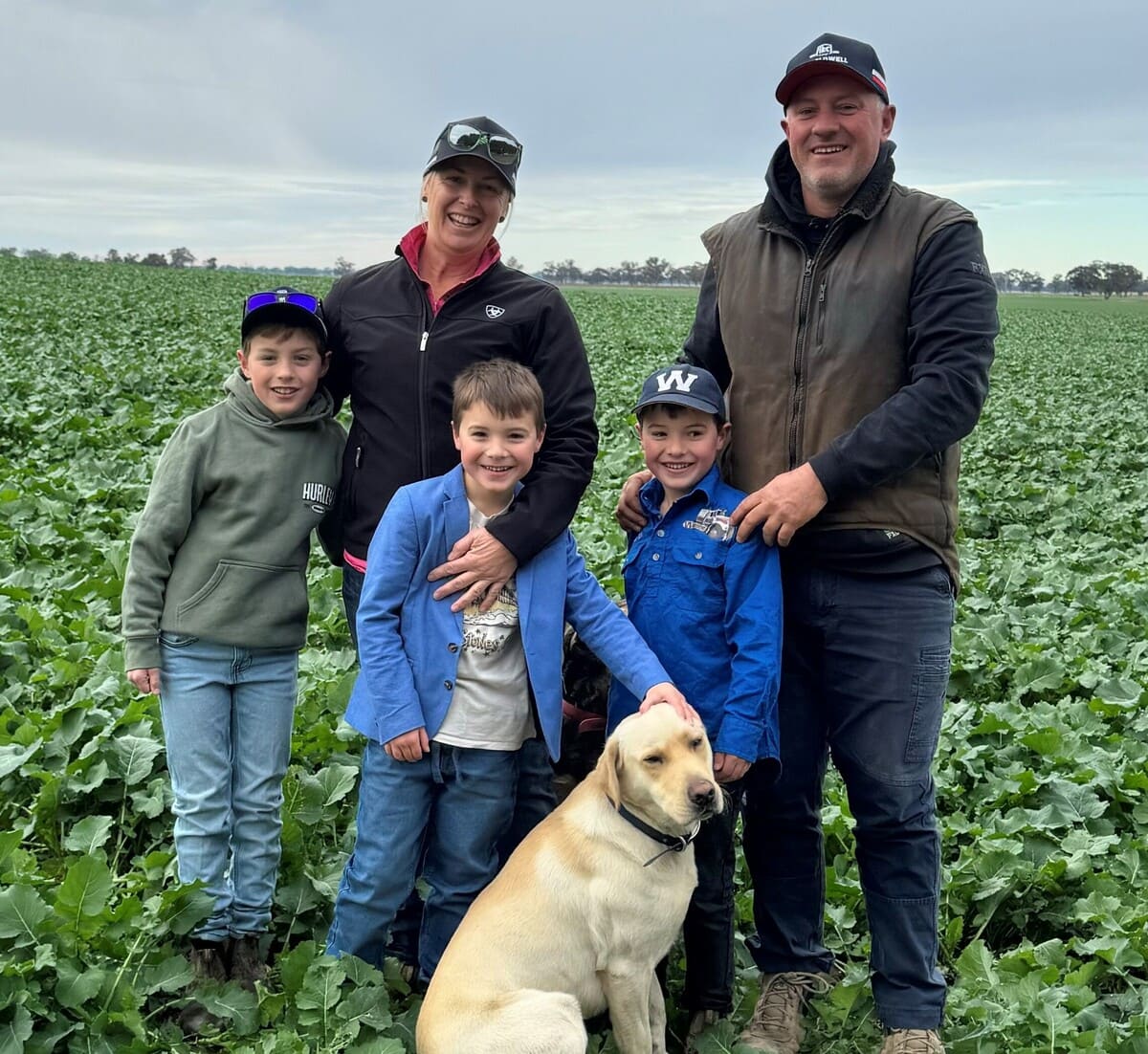
The Blomeley family, Chris and Leanne with children Mitch, Jake and Will.
It was a nervous day when Mulwala’s Chris and Leanne Blomeley sold their Hilux ute to pay for a truck load of urea.
Leanne, who can now reflect with an incredulous shake of the head, smiles “you know things are getting pretty tight when your vehicle’s on the chopping block!”
Armed with youthful energy, and optimism, the young Riverine Plains couple literally threw everything they had at realising their dream of owning their own farm, and today, 12 years – and just over 3000 hectares later, the rewards far outweigh those anxious early days.
Over the past decade the couple has adopted a mixed model of ownership to facilitate their farming aspirations, seeking non-traditional avenues for farming growth.
Whilst Chris concedes that he originally thought it would be “impossible to start from scratch and own land”, their off-farm income, share farming and contracting opportunities inched them close enough to the possibility that it felt within reach.
Having met at Melbourne University’s Dookie College, Chris embarked on a farm management career near Albury whilst Leanne pursued agronomy, and it was the opportunity to lease Leanne’s uncle’s property in 2009 that shifted their goalposts.
“We were both still working full-time jobs and it was an opportunity we couldn’t pass up – it was 870 hectares of country that hadn’t had much done with it, but it was a start. We hired Leanne’s Dad’s tractor and seeder, and Leanne put the crop in on the weekends.”
This opportunity coincided with Chris’s participation in Rabobank’s Farm Management Program (FMP) in New Zealand, with the knowledge gained strengthening the couple’s resolve.
“Chris’s employer generously put Chris through the FMP for career and personal development – although in the end, it was probably to his employer’s detriment, because the FMP was a bit of a catalyst to go farming ourselves,” Leanne explains.
With a nod of agreement, Chris admits that the FMP gave him the confidence, “and a bit of a gee-up” to pave their farming path, with the program providing him with a renewed appreciation, and insights, into the business opportunities farming can afford.
Fortune favours the brave
Unfortunately, it was a rocky start, with their first foray into leasing accompanied by a significant dry spell and subsequently a poor harvest.
“Luckily we were both still working off-farm, saving for our own place, and then suddenly after our first year leasing it felt like we were back to nothing,” Leanne recalls. “It was a really tough time, but I think riding those bumps early on has made us so much more resilient, and realistic.”
With their enthusiasm still intact, the following year they were approached by another of Leanne’s uncles to purchase his property and lease the other part, and while Chris admits it was well before they were ready, it was an opportunity they couldn’t resist.
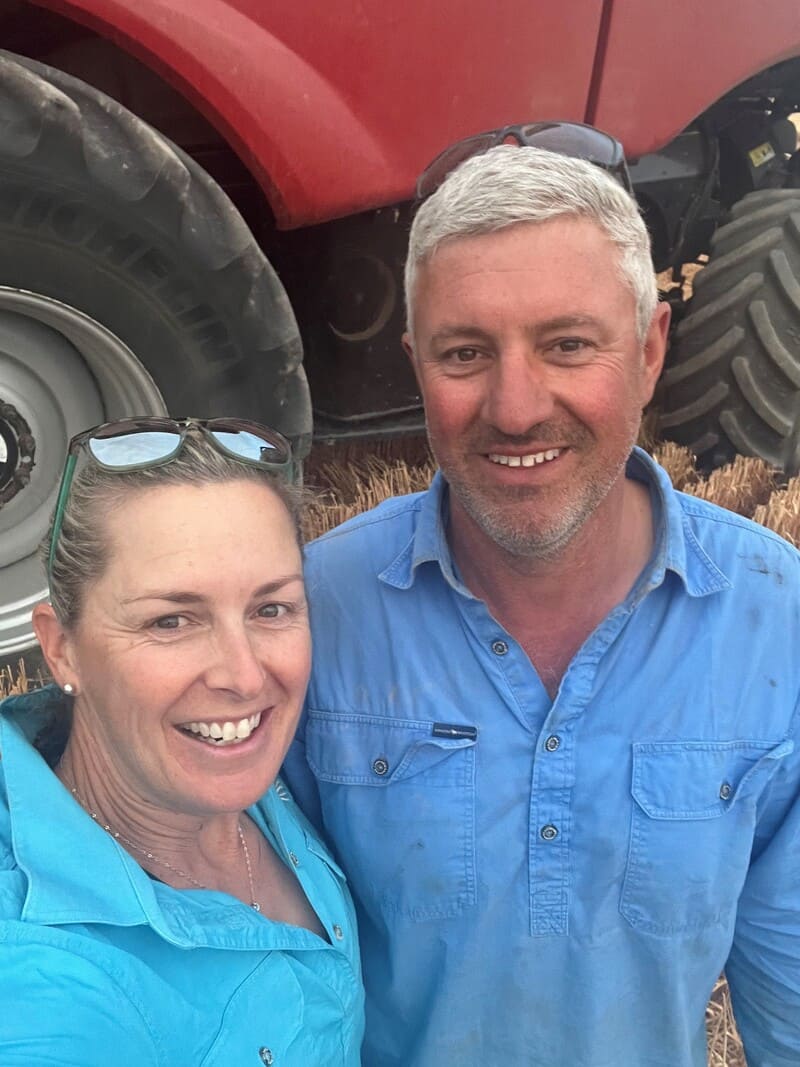
“We bought 121 hectares, so a handy bite-sized purchase, and enjoyed a good winter season – funnily enough our crops were definitely helped along by the sale of the Hilux paying for an extra load of urea!” Chris smiles.
The couple has continued to build up bits and pieces through leasing, share-farming, and purchasing – helping mitigate challenges such as a 2011 mice plague that required a large canola re-sow, and flooding that rendered their original leased block out of production for an entire year in 2012.
“We thought we were done after the 2012 flood, but it actually allowed us time to regroup and reset, and thankfully thanks to our enterprise spread, our other blocks enjoyed a good season and we were able to remain optimistic,” Leanne says.
Their original lease block caused heartache again flooding in 2016 and 2022 – right on the eve of harvest, however the couple appreciate the value of the block in giving them their first stepping stone into farming, and the growth it has since enabled.
A mixed farming ownership model for scale
The gradual expansion of the Blomeleys’ operation – which consists primarily of Wheat, Canola, and Barley – includes additional share farming and leasing opportunities, as well as purchasing Leanne’s parent’s property, “Namron Park” in 2018.
Of their hectares managed, 80 percent is still comprised of share-farming and leasing.
“Growth today doesn’t look like it did twenty years ago, our expansion has been through smaller bites, and it’s been a successful strategy for us so far.”
This, Chris explains, enables them to achieve the viable scale required to invest in better machinery, and increase the equity in the land they’ve purchased.
“For the most part, our machinery replacement has happened as the scale of our business has grown, and we run a mixture of new and second-hand machines.”
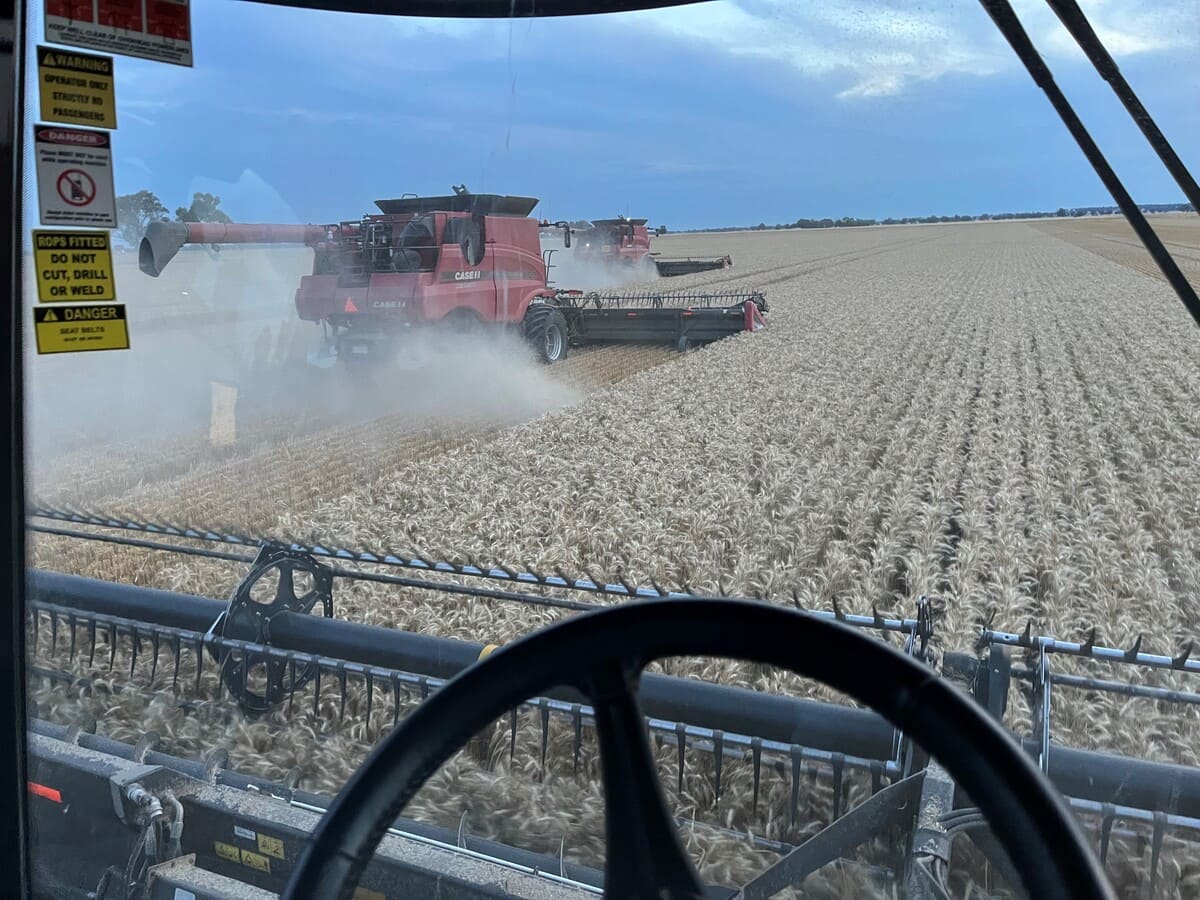
Harvest ’23 was a welcome reward.
Chris eventually left his managerial career to farm full-time, and still provides some contract sowing and harvesting, primarily to facilitate investment into more modern and efficient machinery.
“We prioritise having reliable seeding equipment above all else, getting the seeding part right has genuine yield benefits for us, and it’s something we have more control over – which we found is not often the case in cropping.”
A strong focus on maintaining good, trusted relationships and reputation has also opened doors, whether it’s through neighbours approaching them to share farm, or opportunity from contracting collaborations.
“We have a strong relationship with a fellow producer who we contract sow and harvest for, and in-turn he is geared up for hay production – so if a season doesn’t eventuate, he is always available to us.”
In 2019, this proved to be a valuable partnership, with the Blomeleys’ profiting from strong hay production and drought demand.
The vulnerability in relying on share farming is not lost on the couple, and Leanne says they’re acutely aware of the fact that if one of their share-farmed properties gets sold, they’ll need to manage that change.
“What we tend to find, however, is when one door closes another opens, such is the opportunity in agriculture.”
The strong relationships formed with their various farming partners can put them front of mind with sellers, yet as Chris concedes, having the first offer doesn’t necessarily make it easier to purchase.
“It’s certainly a frustration, we’re finally in a position where we’re looking to purchase more land, but I’m not sure the numbers stack up when you look at interest rates versus lease payments.”
“Leasing and share farming rates certainly haven’t skyrocketed the way land values have, land prices really have been our greatest impediment to growth to date, you get so far and then the goalposts can shift again.”
The couple’s motto is to “look after what we can control, and make sure we maximise profit in good years so we are resilient in the bad ones”.
“It is often said that 90 percent of the money made in farming happens in 10 percent of years, so we need to be ready for that year and make sure we don’t miss it,” Leanne believes.
As an agronomist, her expertise in soil health is an advantage, and they use grid sampling and variable rate lime, gypsum, phosphorus and nitrogen for efficient and optimal application.
Putting a value on people
Leanne and Chris are more than happy to pay for good people, and excluding themselves, estimate labour represents three to four percent of their operating costs.
“So, to pay someone an extra $10 an hour has negligible impact on costs, but can have major financial benefits through improving the efficiency of the business.”
Paying for effective labour is exemplified by the simple fact that during their 15 years in business, they have never had a major breakdown caused by operator error.
The business employs one full-time person, an extra casual labour unit for sowing and then three to four casuals at harvest.
Since 2017, farm consultants Hudson Facilitation, including Tony Hudson facilitator of the Rabobank Financial Skills Workshops, has delivered basic performance reviews after each season, sitting down with the couple for regular scenario analysis comparing opportunities such as land purchases versus machinery upgrades.
Their focus on people extends to the relationship they have with their Rabobank manager, Murray Wallace out of the Albury branch.
“Murray continues to help us increase our efficiencies through machinery and infrastructure projects, and he’s engaged in our vision which is exciting.”
“We approached a number of banks when we were starting out, and in the end, Rabobank had the simplest model,” Leanne explains. “The fact we’ve only had two managers in 15 years, our previous manager being Sally Bull – who remains engaged in our business – is also a very strong selling point.”
“Sally stuck with us during those tricky early years, she saw value in what we were trying to achieve and she was honest and transparent with us, which we appreciate, and it made us so much more resilient.”
Recently, the family – which now includes three young sons, Mitch, nine, and seven-year-old twins Will and Jake – hosted the RaboTruck on their property for a knowledge and networking event, with RaboResearch General Manager Stefan Vogel providing a first-hand commodity update to the crowd.
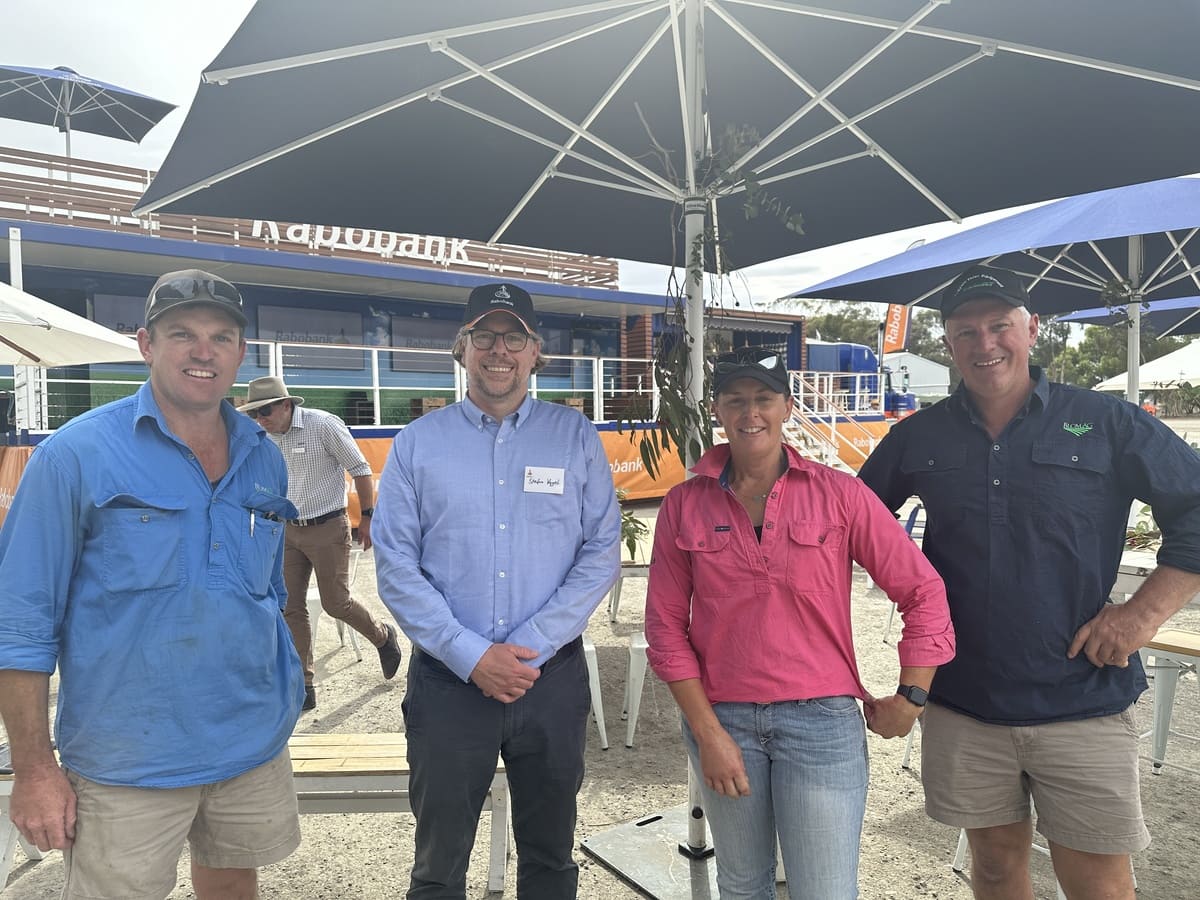
Matt McQualter, Stefan Vogel, Leanne and Chris with The Rabo Truck on-farm.
“It was an excellent day, and we’re continually impressed seeing Rabobank give back to the community – it was incredible to have so many like-minded people gather to catch up and hear from Stefan right here on our farm.”
Rabo Canadian Grains Tour a bucket list opportunity
Taking further advantage of the bank’s global network, Chris and Leanne recently returned from Rabobank’s Canadian Grains Tour, where they joined 36 fellow Australian producers for a behind-the-scenes trip through Canada’s cropping industry.
Visiting farms across Alberta and Saskatchewan, before finishing up at the G3 export terminal in Vancouver, Leanne says they jumped at the opportunity.
“This trip was an absolute bucket list item for both Chris and me, and the opportunity to visit some of the best of western Canada’s agricultural businesses was something we couldn’t miss.”
The couple agree that the Calgary Stampede was a highlight, and both have returned home full of inspiration to think outside the box when looking forward for future opportunities.
Although Chris is quick to add that growing a five tonne per hectare canola crop will probably always be a pipedream!
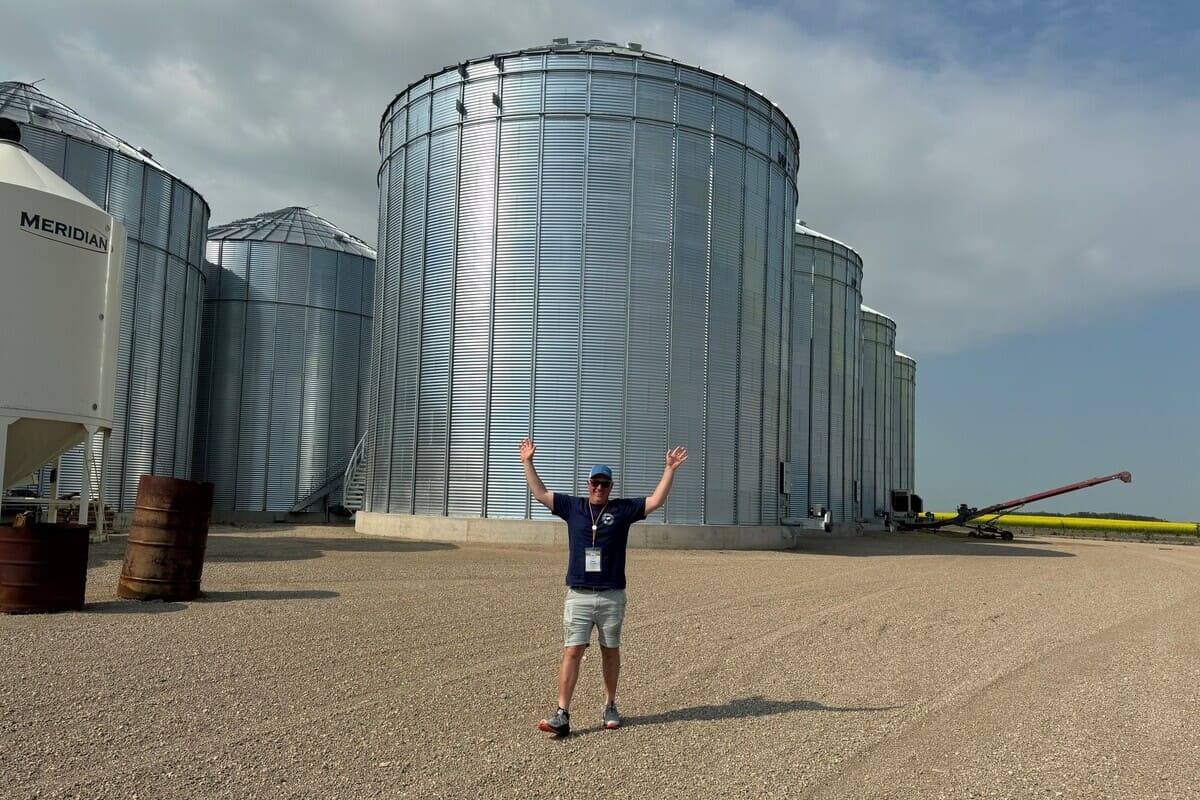
Chris on farm in Canada
With a strong business with further growth potential, and now three young sons to share their journey, the prospects for the family are exciting.
Although, like many a fellow farmer, Chris laughs that it’s hard to reflect on their progression “I tend to focus more on the opportunities I’ve missed!”
While their first years were character-building, Leanne smiles that she could never have imagined the yields and prices of recent years – and despite floods and input costs she acknowledges that the past ten years in ag have been fantastic for them.
The couple remains open-minded about the future, and how farm ownership looks, recently managing a property for a neighbour who wanted to travel for a year.
“Farming lifestyles are changing, people do want to wind down, but not sell, and we’re happy to do things a bit differently and fill those gaps.”
“Whatever the farming future holds for us, whether it’s through ownership or experimenting with more collaborative models, there is still so much opportunity, and it’s an exciting position to be in.”
